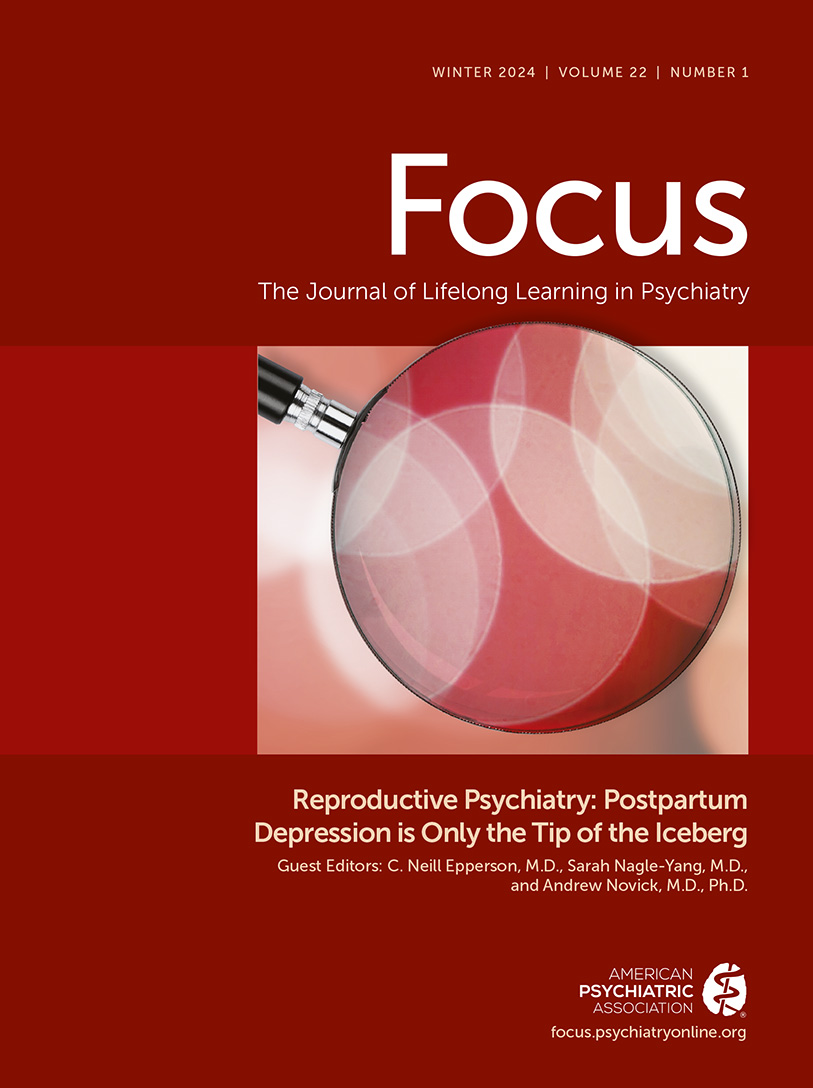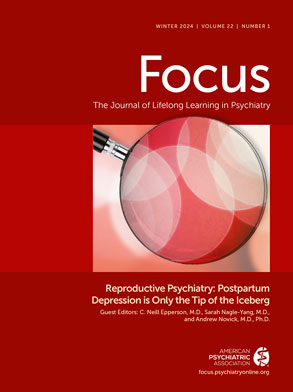Striking the Balance: Bipolar Disorder in the Perinatal Period
Abstract
Epidemiology and Natural History
Biopsychosocial Underpinnings
Assessment and Differential Diagnosis
BOX 1. Differential diagnosis for bipolar disorder in the postpartum period (13, 27–30)
Treatment and Outcomes
General Approach
Preconception.
| Medical professional–specific resources | Resources for both patients and medical professionals |
|---|---|
| National Library of Medicine Drugs and Lactation Database (LactMed): https://www.ncbi.nlm.nih.gov/books/NBK501922 | National Maternal Mental Health Hotline: 1-833-943-5746 |
| Postpartum Support International: Free consult line available to medical professionals who have mental health care questions regarding pregnant or postpartum patients and preconception planning: https://www.postpartum.net/professionals/perinatal-psychiatric-consult-line | Postpartum Support International Helpline: 1-800-944-4773, www.postpartum.net |
| Hale’s Medications & Mother’s Milk textbook or app for purchase: http://www.infantrisk.com | MGH Center for Women’s Mental Health: Blog and topic reviews on reproductive mental health topics: https://www.womensmentalhealth.org |
| Reprotox—subscription service summarizes literature on medications in pregnancy: https://reprotox.org | Mother to Baby Program, Organization of Teratology Information Specialists (OTIS)—Patient-focused fact sheets on specific medications: http://mothertobaby.org |
| National Curriculum in Reproductive Psychiatry: Interactive curriculum designed to teach reproductive psychiatry to mental health professionals: https://ncrptraining.org | Lifeline for Moms: Toolkits and other resources: https://umassmed.edu/lifeline4moms |
| Royal College of General Practitioners Perinatal Mental Health Toolkit: Focus for U.K. physicians | Best Use of Medication in Pregnancy: Patient tracking and leaflets from U.K. teratology: https://www.medicinesinpregnancy.org |
Pregnancy.
| Risks of untreated or undertreated bipolar disorder in pregnancy and (or) lactation | Considerations regarding medication choice |
|---|---|
| Risk of recurrence of mood episodes | Timing of medication exposure in pregnancy and lactation |
| | Treatment response to prior medication trials |
| Risk of adverse obstetrical outcomes related to untreated psychiatric illness | Compounded risk from multiple medication exposures |
| Risks of severe psychiatric outcomes including hospitalizations, suicide attempts and self-injury, risk of harm to the infant, legal system involvement, functional impairment | Considerations re: individuals’ medication exposure during pregnancy: risk of congenital malformations, risk of adverse neonatal events, risk of adverse obstetrical outcomes, risk of adverse neurodevelopmental outcomes |
| Risk for child protection concerns and parent-child relationship disruption due to psychiatric illness | Considerations re: medication exposure during lactation: health status of the infant, frequency of breast feeding, drug dosage, metabolism, and frequency of ingestion, pharmacokinetic properties of the medication, relative infant dose (RID), severity of adverse drug reaction |
Lactation.
Psychosocial Treatments
Pharmacotherapy
Lithium
Teratogenicity.
Obstetrical outcomes.
Neonatal outcomes.
Long-term effects.
Lactation.
Management during pregnancy.
Lamotrigine
Teratogenicity.
Obstetrical outcomes.
Neonatal outcomes.
Long-term effects.
Lactation.
Management during pregnancy.
Antipsychotics
Teratogenicity.
Obstetric risks and maternal outcomes.
Neonatal risks and infant outcomes.
Lactation.
Management during pregnancy.
Benzodiazepines
| Medication | Preconception | 1st trimester | 2nd/3rd trimester | Postpartum | Lactation relative infant dose |
|---|---|---|---|---|---|
| Lithium (Li) (68, 77, 100) | Baseline serum Li, thyroid and renal function studies; check these periodically throughout pregnancy | Monthly serum Li levels, monitor more closely with emesis | Monthly serum Li levels | Serum Li levels at 24–48 hours, then (bi-)weekly, adjusting doses to maintain high therapeutic levels (e.g., .8–1.0 mmol/L) for up to 1 month after delivery | .87%–7.29% |
| | Consider high-dose folic acid supplementation | Doses >900 mg/day associated with greater teratogenic risk | High level US at 16–20 wks gestation | Consider decreasing Li immediately to pre-pregnancy dose | Screen infant for dehydration, prematurity, and impaired renal function |
| | Split dose | | Consider dose adjustment due to increased clearance | Avoid NSAIDs or other nephrotoxic medications | Coordinate with infant’s pediatrician |
| | Counsel on risks | | Weekly levels beginning at 34 weeks | Periodically check infant serum Li, Cr, BUN, TSH | |
| | Consider taper if stable | | Consider holding Li 24–48 hrs prior to delivery | | |
| | | | Hospital delivery with high-level neonatology services | | |
| | | | Adequate hydration | | |
| Lamotrigine (LTG) (83, 100, 104) | Counsel on risks | Monthly LTG levels with dose increases of 20%–25% to maintain baseline level or address clinical symptoms | Monthly LTG levels with dose increases of 20%–25% to maintain baseline level or address clinical symptoms | Frequent monitoring to prevent toxicity | 6.62%–18.27% |
| | Baseline serum LTG | | | Reduction of dose by 25% immediately postpartum with further decreases every 3–4 days until reaching pre-pregnancy dose | |
| | Consider high-dose folic acid supplementation | | | | |
| | Split dosing | | | | |
| Carbamazepine (CBZ) (100, 128, 129) | Counsel on risks, including early exposure | Recommendation for low-dose CBZ therapy only with caution (up to 1000 mg daily) | Drug monitoring is optional and dosing adjustment is not necessary | Vitamin K 1 mg to newborn | 3.8%–5.9% |
| | Folic acid supplementation recommended (4 mg) | | Consider vitamin K in last month | Drug monitoring is optional and dosing adjustment is not necessary postpartum | Monitor infants for jaundice, drowsiness, adequate weight gain, and developmental milestones |
| Valproic acid (VPA) (34, 100, 128, 130) | VPA should not be prescribed to those of childbearing age | Lowest effective dose should be used | Drug monitoring and dosing adjustment is not necessary throughout pregnancy | Drug monitoring and dosing adjustment is not necessary postpartum | .99%–5.6% |
| | If prescribed, provide advice on effective contraception, pregnancy prevention, and risks associated with VPA use during pregnancy | | | | Monitor infants for jaundice or other signs of liver damage |
| | Folic acid supplementation recommended (4 mg) | | | | |
| Antipsychotics (APs) (100, 120–122) | Long acting injectables should be considered similarly in pregnant patients as nonpregnant patients | Decrease clozapine dose accordingly if patient reduces or stops smoking cigarettes during pregnancy | Consider dose adjustment due to increased clearance based on symptom assessments | Consider decrease back to the original preconception dose to prevent adverse side effects and toxicity | Aripiprazole: .7%–6.44%; haloperidol: .2%–12%; olanzapine: .28% - 2.24%; quetiapine: .02%–.1% |
| | | | | Monitor clozapine-exposed infants for up to 8 days | |
| | | | | Avoid co-sleeping on sedating APs | Infants exposed to APs through breast milk should be monitored for sedation |
| | | | | | Infants exposed to clozapine should be monitored for agranulocytosis |
| Benzodiazepines (includes Z-drugs) (BZD) (100, 125) | Counsel on risks | Lorazepam first-line, limit to lowest dose and as needed over scheduled dosing when possible | Lowest dose and as needed over scheduled dosing when possible to minimize neonatal withdrawal | Use may impact ability to stay alert for nocturnal signals of infant (54) | Lorazepam: 2.6%–2.9%; monitor infant for sedation. Clonazepam RID: 2.8%; monitor for infant sedation |
| | | | | Avoid co-sleeping | |
Future Directions
Footnotes
References
Information & Authors
Information
Published In
History
Keywords
Authors
Competing Interests
Metrics & Citations
Metrics
Citations
Export Citations
If you have the appropriate software installed, you can download article citation data to the citation manager of your choice. Simply select your manager software from the list below and click Download.
For more information or tips please see 'Downloading to a citation manager' in the Help menu.
View Options
View options
PDF/EPUB
View PDF/EPUBLogin options
Already a subscriber? Access your subscription through your login credentials or your institution for full access to this article.
Personal login Institutional Login Open Athens loginNot a subscriber?
PsychiatryOnline subscription options offer access to the DSM-5-TR® library, books, journals, CME, and patient resources. This all-in-one virtual library provides psychiatrists and mental health professionals with key resources for diagnosis, treatment, research, and professional development.
Need more help? PsychiatryOnline Customer Service may be reached by emailing PsychiatryOnline@psych.org or by calling 800-368-5777 (in the U.S.) or 703-907-7322 (outside the U.S.).

